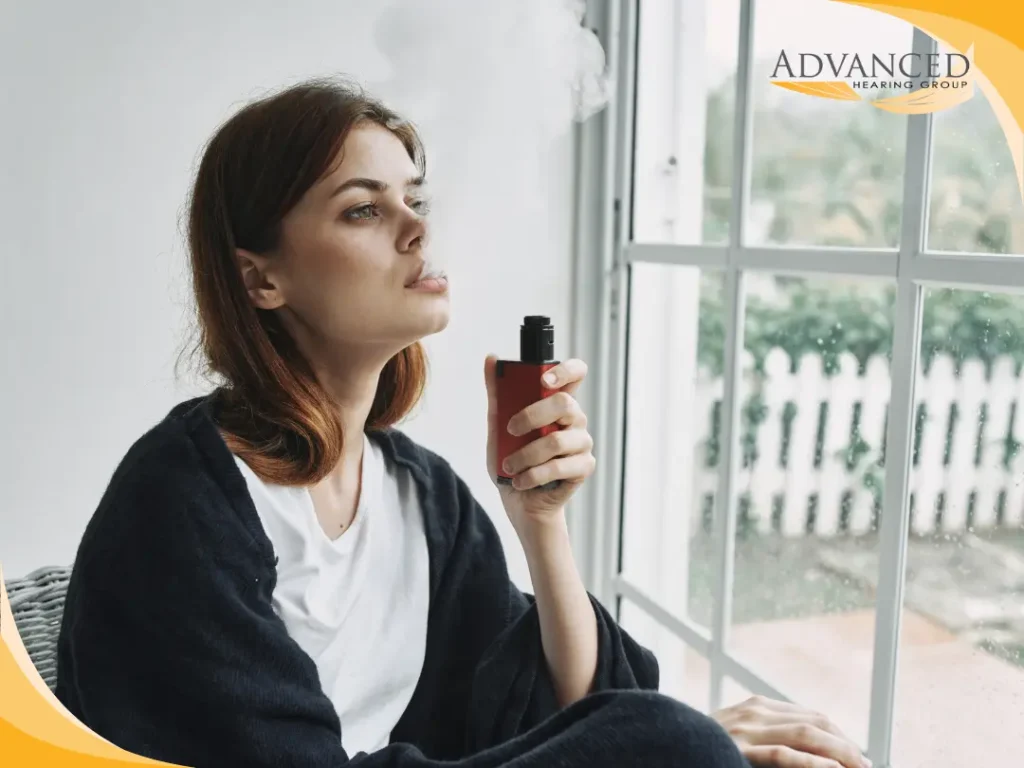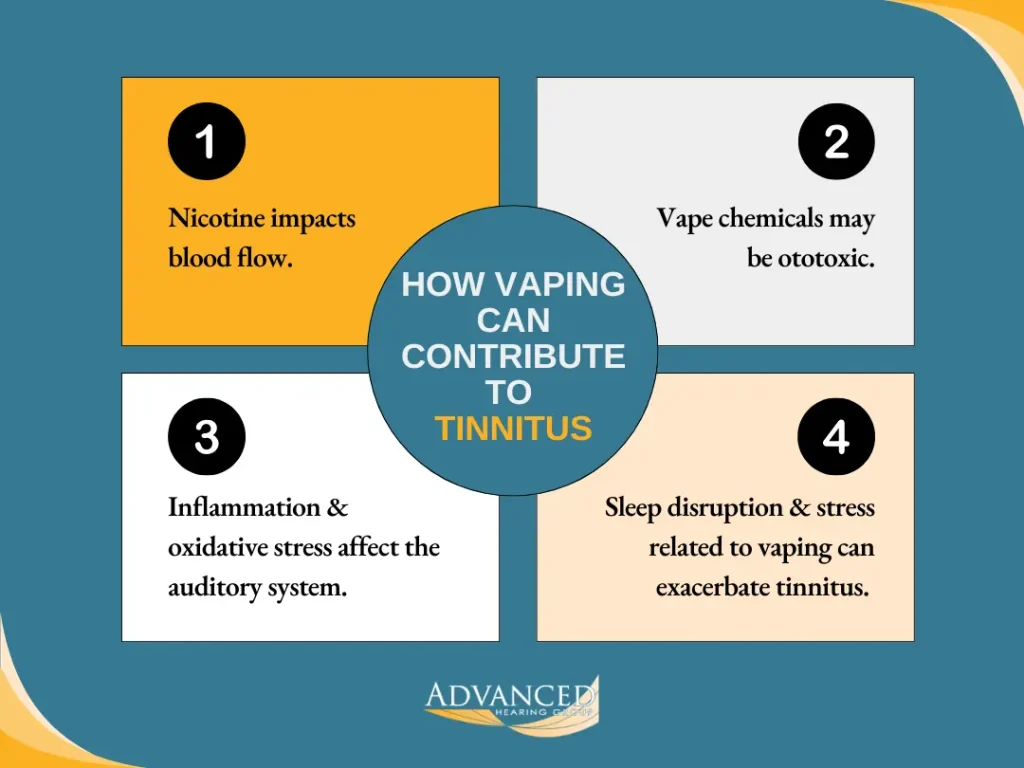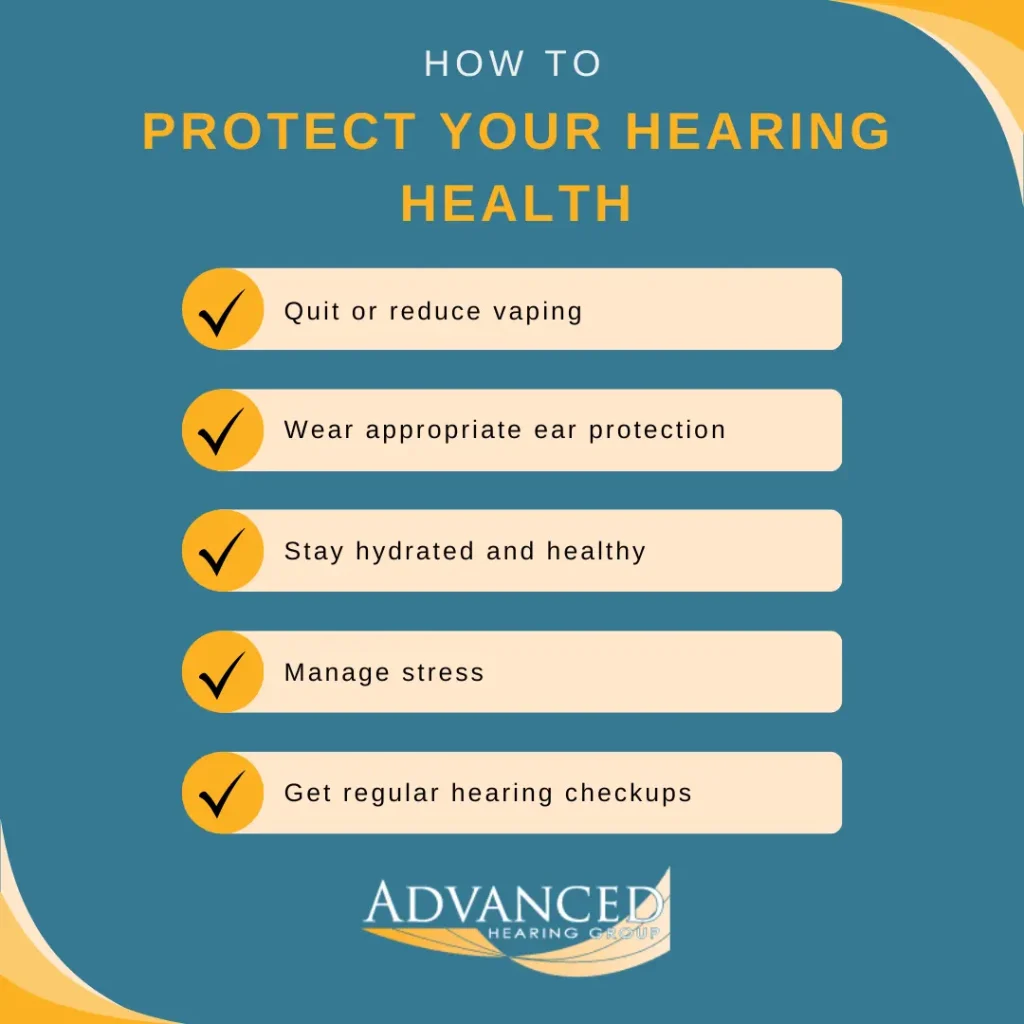
At Advanced Hearing Group, we’re dedicated to helping our community understand how lifestyle choices can impact hearing health. One topic that’s been buzzing lately (no pun intended!) is the potential connection between vaping and tinnitus. As audiologists, we get a lot of questions about this. Here, we’ll dive into what tinnitus is, how vaping might play a role, and answer some of the most common questions we hear in our Mesa, North Scottsdale, and South Scottsdale audiology clinics.
What is Tinnitus?
Tinnitus is the perception of sound—like ringing, buzzing, hissing, or clicking—in your ears or head when no external sound is present. It’s not a condition itself but rather a symptom of an underlying issue. This could include hearing loss, ear injury, or even stress. For some, tinnitus is a minor annoyance. For others, unfortunately, it can significantly affect quality of life, making it hard to focus or sleep.
At Advanced Hearing Group, we work with patients every day to identify the root causes of tinnitus and create personalized management plans. Lately, we’ve noticed more patients asking whether their vaping habits could be contributing to their symptoms. Let’s explore this connection.
Vaping: A Quick Overview
Vaping involves inhaling vapor produced by an electronic device, like an e-cigarette or vape pen, which heats a liquid containing nicotine, flavorings, and other chemicals. It’s often marketed as a “safer” alternative to smoking traditional cigarettes, but the long-term health effects are still being studied. While vaping avoids some of the harmful tar and combustion byproducts of smoking, it introduces other chemicals into the body. These may have unexpected consequences, including impacting your hearing health.
Watch this video to learn more: Vaping and Hearing Loss: What You Need to Know
Understanding the Possible Link Between Vaping and Tinnitus
While research on vaping and tinnitus is still emerging, there are a few reasons why vaping might contribute to or worsen tinnitus symptoms:

1. Nicotine’s Effect on Blood Flow
Nicotine, a common ingredient in vape liquids, is a vasoconstrictor. This means it narrows blood vessels and reduces blood flow. Your inner ear relies on a steady supply of oxygen-rich blood to function properly. Restricted blood flow could stress the delicate structures of the cochlea (the hearing organ in your inner ear), potentially triggering or worsening tinnitus.
2. Chemical Exposure
Vape liquids contain various chemicals, such as propylene glycol and vegetable glycerin, as well as flavoring agents. Some of these chemicals may be ototoxic (toxic to the ear) in high doses or with prolonged exposure. While studies are limited, certain ototoxic substances are known to damage the hair cells in the inner ear, which could lead to hearing issues, including tinnitus.
3. Inflammation and Oxidative Stress
Vaping can cause inflammation and oxidative stress in the body, which may affect the auditory system. Chronic inflammation in the ear could contribute to tinnitus or make existing symptoms more noticeable.
4. Stress and Sleep Disruption
Nicotine is a stimulant, and vaping can sometimes lead to increased anxiety or disrupt sleep patterns. Both stress and poor sleep are known to exacerbate tinnitus, as they heighten the brain’s perception of the phantom sounds.
While these connections are plausible, it’s important to note that direct, large-scale studies linking vaping to tinnitus are still in their early stages. At Advanced Hearing Group, we encourage a cautious approach and recommend monitoring your symptoms if you vape and experience tinnitus.
Common Questions About Vaping and Tinnitus
Here are some of the most frequent questions we hear at our Mesa, North Scottsdale, and South Scottsdale audiology clinics:
1. Can vaping cause tinnitus?
Currently, there’s no definitive evidence that vaping directly causes tinnitus. However, the nicotine and chemicals in vape liquids could contribute to conditions that trigger or worsen it. If you’ve noticed tinnitus symptoms after starting to vape, it’s worth discussing with an audiologist to rule out other factors, like noise exposure or ear infections.
2. Will quitting vaping stop my tinnitus?
Quitting vaping may help reduce tinnitus symptoms, especially if nicotine or chemical exposure is a contributing factor. However, tinnitus can have multiple causes, so stopping vaping might not eliminate it entirely. We recommend a comprehensive hearing evaluation to identify all potential triggers and create a personalized management plan.
3. Is vaping worse for tinnitus than smoking?
Both vaping and smoking introduce substances that can affect your auditory system. Smoking is well-known to increase the risk of hearing loss and tinnitus due to its impact on blood flow and oxygen delivery to the ears. Vaping may pose similar risks due to nicotine and chemical exposure, but more research is needed to compare the two directly.
4. Can the flavorings in vape liquids affect my ears?
Some flavoring chemicals, like diacetyl (used in buttery or creamy vape flavors), have been linked to other health issues, such as lung damage. While there’s no direct evidence tying vape flavorings to tinnitus, ototoxic chemicals could theoretically harm the inner ear.
5. What should I do if I think vaping is causing my tinnitus?
Tinnitus can stem from many sources, and vaping might be just one piece of the puzzle. Schedule a visit with one of our audiologists at Advanced Hearing Group. We’ll perform a thorough hearing test, review your medical history, and discuss your vaping habits to pinpoint possible causes. From there, we can recommend strategies like sound therapy, hearing aids, or lifestyle changes to manage your symptoms.
Tips for Protecting Your Hearing Health
Whether you vape or not, taking care of your ears is essential. Here are a few tips we share with our patients at Advanced Hearing Group:

- Evaluate Your Vaping Habits: If you vape, consider quitting, reducing your use, or switching to lower-nicotine options to minimize potential effects on your ears.
- Protect Your Ears: Avoid loud environments or use ear protection to prevent noise-induced hearing damage, which can worsen tinnitus.
- Stay Hydrated and Healthy: Proper hydration and a balanced diet support overall ear health by promoting good blood flow.
- Manage Stress: Stress can amplify tinnitus. Try relaxation techniques like meditation or yoga to keep it in check.
- Get Regular Hearing Checkups: Routine visits to our Mesa, North Scottsdale, or South Scottsdale offices can catch issues early and help you stay on top of your hearing health.
Effective Tinnitus Solutions in Mesa and Scottsdale, AZ
At Advanced Hearing Group, we’re passionate about empowering our community with knowledge and solutions for better hearing. If you’re concerned about tinnitus, vaping, or any aspect of your auditory health, our team of experienced audiologists is here to guide you. With offices conveniently located in Mesa, North Scottsdale, and South Scottsdale, we’re ready to provide personalized care in a warm, welcoming environment.
Contact us today to schedule a hearing evaluation or ask any questions about tinnitus and vaping. We’re here to help you hear well so you can live well!
Disclaimer: The information in this blog is for educational purposes only and is not a substitute for professional medical advice. Always consult a healthcare provider for personalized guidance.

